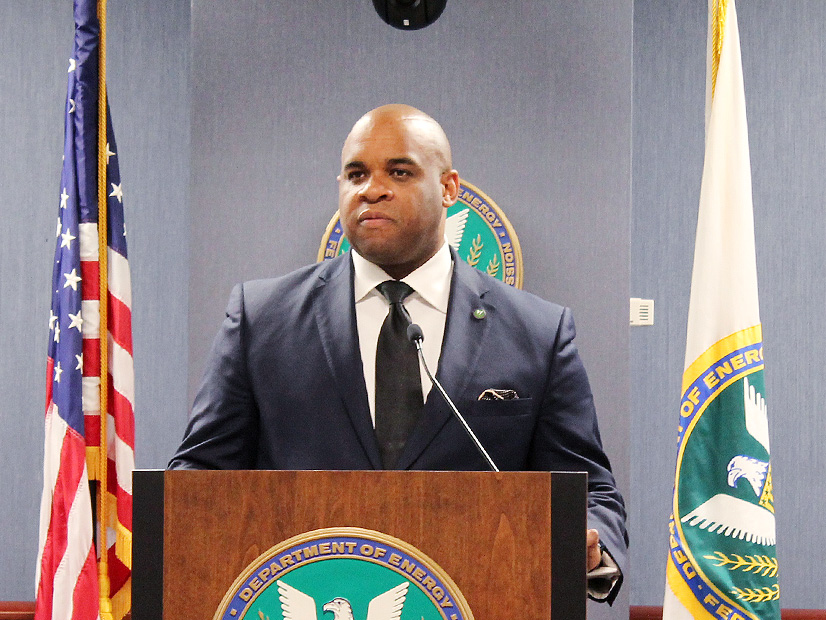
Acting FERC Chairman Willie Phillips presided over his first open meeting Thursday, announcing a roundtable on environmental justice and his key staffers.
“I have to tell you, never in a million years would I think that somebody like me would lead an agency for the United States government, [coming] from a place like where I am from,” Phillips said.
Phillips is just the fourth African American to serve on the commission, and he often talks about his upbringing in rural Alabama and how it influences his work as a regulator. His priorities remain reliability, transmission, and environmental justice and equity issues, he said.
Phillips plans to move forward with FERC’s work on improving its transmission planning policies that started under his predecessor, Richard Glick, including efforts to improve the interconnection queues, changes to regional planning, cost management and interregional transfer capability.
On environmental justice and equity, Phillips announced a commissioner-led roundtable that will be held March 29 and is meant to further the goals of FERC’s Equity Action Plan issued last year that aims to reduce barriers to meaningful participation by underserved communities.
“This will provide an opportunity for FERC to hear from stakeholders on how the commission can better incorporate environmental justice and equity considerations,” Phillips said. “Growing up in rural Alabama, I know first-hand the effect that government can have on communities. It is important that we consider the voices of historically disadvantaged communities in our decisions.”
Phillips’ staff is led by FERC’s new chief of staff, Ronan Gulstone; Senior Transmission Counsel Karin Herzfeld; and Senior Legal Adviser Stacey Steep, who will focus on energy projects and permitting. All three worked for Phillips when he was a commissioner, with Gulstone coming over from D.C. government and the other two joining his staff from other offices at FERC.
Commissioners James Danly and Mark Christie briefly offered their congratulations to the new chairman in their opening comments. The meeting began on time and lasted only about an hour; Danly noted that he did not file any dissents on any of the orders issued.
Somber Comments from Clements
Speaking to reporters after the meeting, Phillips was optimistic about advancing the commission’s more controversial initiatives begun under Glick.
“Throughout my whole legal career, I have made a point of making a priority of consensus building,” he said. “That is how I cut my teeth working at NERC; it is a consensus-based organization. … You may have noticed that I haven’t any dissents since coming to FERC. … When I believe something is important to me, I work hard to meet my colleagues where they are and get it in the majority. I think that’s possible because I’ve done it, and I have no doubt that we can do it again, together.”
He also balked at a question of whether the commission would wait for a fifth member to continue work on the natural gas pipeline certificate policy proposals issued under Glick.
“As a global matter, we’re not waiting on anything. We’re moving forward. The commission will not sit on our hands.”
Commissioner Allison Clements, however, was more somber about the situation FERC finds itself in now.
“It’s an unfortunate set of circumstances that leave this chair next to me being empty today,” Clements said. “One thing we’ve learned over the last few months is that, because of the important work FERC does and the issues our jurisdiction spans, this agency has moved beyond the time when it got to stay out of the broader political limelight. So, the question for me, then, is how to bring forward, into this new normal, successful approaches to achieve our statutory responsibilities.”
While most orders FERC issues are done unanimously, the reality is that the hard orders that do lead to disputes among the commissioners are often the cutting edge of a changing industry that has be overseen with an “outdated and undermatched” regulatory framework.
Dealing with those thornier issues is still possible, and Clements said FERC should renew its commitment to technology neutrality and use “data-driven decision-making.”
“Only when we are willing to look at good data and credible studies, no matter the author, can we address reliability and cost issues in concrete terms on a forward-looking basis,” Clements said. “Only when we address reliability and cost issues in concrete terms can we decide whether and how much change is needed, and where any needed change may fall on the spectrum from incremental to wholesale reform.”
FERC should also prioritize the “public” in public interest, which means improving public access to it and ensuring transparency.
“It means fairly considering good arguments no matter which stripe the stakeholder who makes them wears,” Clements said. “And it means being open to the idea of making changes requested by stakeholders, small and large, because they make our decisions better.”
Clements did not respond to a request for an interview about her comments.



